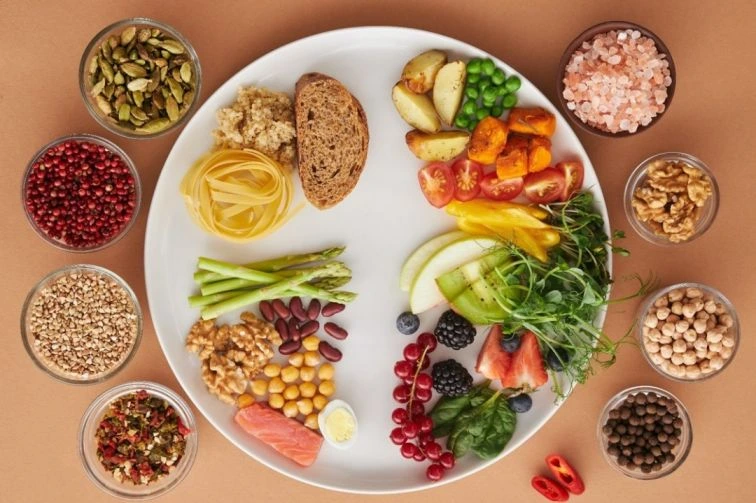
The fundamentals of healthy eating are covered in these eight useful suggestions, which will assist you in making better decisions.Eating the appropriate number of calories for your level of activity is essential to maintaining a healthy diet because it balances the energy you take in and expend.
You will gain weight if you consume more food or liquids than your body requires since the extra energy is stored as fat. You will lose weight if you eat and drink too little.To ensure that you're eating a balanced diet and that your body is getting all the nutrients it needs, you should also eat a variety of foods.
Men should consume around 2,500 calories (10,500 kilojoules) each day. Approximately 2,000 calories (8,400 kilojoules) should be consumed daily by women.In the UK, the majority of persons consume more calories than they require and ought to consume fewer.
Read also: Quick Healthyish Lunch Recipes For Work
Healthy Eating Daily Tips
1. Make higher-fiber starchy carbs the foundation of your meals.
Just over one-third of your diet should consist of starchy carbs. These consist of cereals, bread, rice, pasta, and potatoes.Select wholegrain or higher-fiber options, such brown rice, wholewheat pasta, or skin-on potatoes.
Compared to white or refined starchy carbs, they have more fiber and can prolong feelings of fullness. For every big meal, try to incorporate at least one starchy food. Although the carbohydrates in starchy meals contribute less than half the calories of fat per gram, some individuals believe that they cause weight gain.
When cooking or serving these kinds of meals, watch how much fat you use, such as oil on chips, butter on bread, or creamy sauces on pasta, as this is what raises the calorie count.
2. Eat a lot of vegetables and fruits.
Eating at least five servings of a range of fruits and vegetables each day is advised. They can be canned, dried, frozen, fresh, or juiced.It's not as hard as it seems to get your five a day. Why not have a piece of fresh fruit instead of your typical mid-morning snack, or cut a banana over your porridge for breakfast?
Fruits and vegetables, whether fresh, tinned, or frozen, weigh 80g each. 30g is a serving of dried fruit, which should only be consumed during mealtimes.A 150ml glass of fruit juice, vegetable juice, or smoothie also counts as one serving; however, since these beverages are high in sugar and might harm your teeth, you should only consume one glass per day.
Read also: Air Fryer Mini Dark Cocoa Cake with Brown Butter Frosting.
3. Increase your intake of seafood, especially oily fish.
In addition to being high in vitamins and minerals, fish is a wonderful source of protein.
Eat at least two servings of fish every week, including at least one serving of fatty fish.
Omega-3 fats, which are abundant in oily fish, may help prevent heart disease.
- Among the oily fish are:
- Mackerel, salmon, trout, herring, sardines, and pilchards
- Among non-oily fish are:
- Hake, Haddock Plaice, Coley, and Tuna Skate
Fresh, frozen, and canned fish are all options, but keep in mind that smoked and canned fish may include a lot of salt.Although there are suggested limitations for certain fish species, most individuals should consume more fish.
4. Reduce sugar and saturated fat intake
You should include some fat in your diet, but you should be mindful of the kind and quantity of fat you consume.Saturated and unsaturated fat are the two primary forms of fat. An excessive amount of saturated fat raises blood cholesterol levels, which raises the risk of heart disease.
Men should consume no more than 30g of saturated fat per day on average. Women should consume no more than 20g of saturated fat per day on average.
Although children under the age of five should not follow a low-fat diet, children under the age of eleven should consume less saturated fat than adults. Furthermore, until the child is two years old, full-fat dairy products like cheese, fromage frais, and yoghurt are advised.
Read also: Brown Sugar Garlic Air Frying Salmon
Many foods contain saturated fat, including:?
- Sausage,
- butter,
- hard cheese,
- cream cakes, and fatty meat cuts
- lard pies and biscuits
Eat less saturated fat and more unsaturated fat-containing foods, such avocados, oily salmon, and vegetable oils and spreads.Use a tiny quantity of vegetable or olive oil, or reduced-fat spread, in place of butter, lard, or ghee for a healthier option.
Select lean cuts of meat and trim off any excess fat while eating it.Due to their high energy content, all forms of fat should only be consumed in moderation.
Sugar
Frequent use of sugar-rich meals and beverages raises your risk of tooth decay and obesity.Consuming sugary foods and beverages often might lead to weight gain since they are high in energy (measured in kilojoules or calories). Additionally, they can lead to tooth decay, particularly if consumed in between meals.
Any sugar that is naturally present in honey, syrups, unsweetened fruit juices, and smoothies, or that is added to food or beverages, is referred to as a free sugar.Instead of reducing the sugar in fruit and milk, you should reduce this kind of sugar.
Unexpectedly large levels of free sugars are present in a lot of packaged meals and beverages.
Many foods contain free sugars, including:
- sugary carbonated beverages.
- sweet cereals for breakfast.
- cakes.
- pastries.
- puddings.
- biscuits.
A food is considered high in sugar if it contains more than 22.5g of total sugars per 100g, and low in sugar if it contains 5g or less.
5. Consume less salt—adults should consume no more than 6g daily.
- Consuming excessive amounts of salt can increase blood pressure. High blood pressure increases a person's risk of heart disease and stroke.
- You can be overeating even if you don't season your food with salt.
- When you purchase foods like breads, soups, morning cereals, and sauces, almost three-quarters of the salt you consume is already there.
- Utilize food labels to reduce. A food is considered high in salt if it contains more than 1.5g of salt per 100g.
- No more than 6g (about a teaspoonful) of salt should be consumed daily by adults and children 11 years of age and above. Even less should be given to younger kids.
6. Be active while maintaining a healthy weight.
Regular exercise may help lower your chance of developing significant health disorders, in addition to consuming a healthy diet. It's crucial for your general health and well-being as well.
Learn more about the advantages of exercise and adult physical activity recommendations. Obesity and excess weight increase the risk of heart disease, stroke, type 2 diabetes, and several types of cancer. Your health may also suffer if you are underweight.
7. Avoid being thirsty
- To prevent dehydration, you must consume a lot of water. Six to eight glasses should be consumed daily, according to official guidelines. This is on top of the fluid that comes from your diet.
- While all non-alcoholic beverages are acceptable, water, milk with less fat, and beverages with less sugar, such as tea and coffee, are healthier options.
- Because they are heavy in calories, try to stay away from sugary soft drinks and carbonated beverages. They harm your teeth as well.
- Free sugar is present in even unsweetened fruit juice and smoothies.
- You should limit your daily intake of fruit juice, vegetable juice, and smoothies to no more than 150ml, or a small glass.
8. Eat breakfast every day.
Some people believe that skipping breakfast will aid in their weight loss. However, a nutritious breakfast that is low in fat, sugar, and salt and rich in fiber can help you obtain the nutrients you need for optimal health and can be a component of a balanced diet. A delicious and healthy breakfast is a wholegrain lower-sugar cereal with fruit cut on top and semi-skimmed milk.
More details
You may achieve the proper balance of the five major food categories with the aid of the Eatwell Guide. According to the recommendations, each food category should account for a certain percentage of your diet.
.







